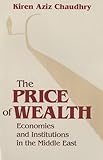The Price of Wealth : Economies and Institutions in the Middle East / Kiren Aziz Chaudhry.
Material type: TextSeries: Cornell Studies in Political EconomyPublisher: Ithaca, NY : Cornell University Press, [2015]Copyright date: ©2015Description: 1 online resource (352 p.)Content type:
TextSeries: Cornell Studies in Political EconomyPublisher: Ithaca, NY : Cornell University Press, [2015]Copyright date: ©2015Description: 1 online resource (352 p.)Content type: - 9781501700347
- 338.953
- HC415.33 .C49 1997
- online - DeGruyter
| Item type | Current library | Call number | URL | Status | Notes | Barcode | |
|---|---|---|---|---|---|---|---|
 eBook
eBook
|
Biblioteca "Angelicum" Pont. Univ. S.Tommaso d'Aquino Nuvola online | online - DeGruyter (Browse shelf(Opens below)) | Online access | Not for loan (Accesso limitato) | Accesso per gli utenti autorizzati / Access for authorized users | (dgr)9781501700347 |
Frontmatter -- Contents -- Acknowledgments -- Glossary of Saudi Archival Documents -- 1. Oil and Labor Exporters in the International Economy -- I. Institutional Origins in Isolation -- 2. The National Market Unified -- 3. Taxation and Economic Fragmentation -- II. The Boom -- 4. The Business of the Bureaucracy -- 5. Migrants and Magnates -- 6. Informal and Formal Banking -- III. The Bust -- 7. Beyond the Paradox of Autonomy -- 8. Worlds within the Third World -- Index
restricted access online access with authorization star
http://purl.org/coar/access_right/c_16ec
The emerging consensus that institutions shape political and economic outcomes has produced few theories of institutional change and no defensible theory of institutional origination. Kiren Aziz Chaudhry shows how state and market institutions are created and transformed in Saudi Arabia and Yemen, two countries that typify labor and oil exporters in the developing worlds.In a world where the international economy dramatically affects domestic developments, the question of where institutions come from becomes at once more urgent and more complex. In both Saudi Arabia and Yemen, fundamental state and market institutions forged during a period of isolation at the end of World War I were destroyed and reshaped not once but three times in response to exogenous shocks. Comparing boom-bust cycles, Chaudhry exposes the alternating social and organizational origins of institutions, arguing that both broad changes in the international economy and specific forms of international integration shape institutional outcomes. Labor and oil exporters thus experience identical economic cycles but generate radically different state, market, and financial institutions in response to different resource flows.Chaudhry supplemented years of field work in Saudi Arabia and Yemen with extensive analysis of previously unavailable materials in the Saudi national archives.
Mode of access: Internet via World Wide Web.
In English.
Description based on online resource; title from PDF title page (publisher's Web site, viewed 26. Apr 2024)


